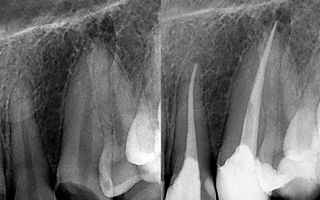Endodontics Armadale
Save your soft tissues inside your teeth with expert endodontic care and root canal treatment.

What is endodontics?
Endodontics involves looking at the soft tissue inside the tooth. This includes the root of each tooth, the pulp inside the tooth, as well as the nerves and surrounding tissue.
Ideally, you’ll never have to think about this part of your tooth, but it is possible for these soft tissues to become infected, or even die off. When the pulp becomes infected like this, it is known as pulpitis, and some mild cases can be reversible with care and medication, but severe cases are irreversible.

When this happens, it can result in severe dental pain and sensitivity. You will likely notice very quickly and will need to make an immediate appointment with your dentist.
Usually, these infections occur due to tooth decay and cavities. Normally, your dentist will give you a dental filling to repair these cavities, but if the decay is too close to the nerve, or goes into the nerve, further treatment may be required. Other causes include fractured teeth and injuries.
For cases of irreversible pulpitis (when the nerve of the tooth is irreversibly inflamed from decay or trauma), it is likely that your dentist will recommend a root canal treatment.
What is a root canal?
Root canal therapy is needed when the nerve of a tooth is affected by decay or infection. In order to save the tooth, the pulp (the living tissue inside the tooth), nerves, bacteria, and any decay are removed and the resulting space is filled with special, medicated, dental materials, which restore the tooth to its full function.
Having a root canal done on a tooth is the treatment of choice to save a tooth that otherwise would die and have to be removed. Many patients believe that removing a tooth that has problems is the solution, but what is not realised is that extracting (pulling) a tooth will ultimately be more costly and cause significant problems for adjacent teeth.
Root canal treatment is highly successful and usually lasts a lifetime, although on occasion, a tooth will have to be retreated due to new infections.
What does a root canal require?
A root canal procedure requires one or more appointments and can be performed by a dentist or endodontist (a root canal specialist).
While the tooth is numb, a rubber dam (a sheet of rubber) will be placed around the tooth to keep it dry and free of saliva. An access opening is made on top of the tooth and a series of root canal files are placed into the opening, one at a time, removing the pulp, nerve tissue, and bacteria. If tooth decay is present, it will also be removed with special dental instruments.

Once the tooth is thoroughly cleaned, it will be sealed with either a permanent filling or, if additional appointments are needed, a temporary filling will be placed.
At the next appointment, usually a week later, the roots and the inside cavity of the tooth will be filled and sealed with special dental materials. A filling will be placed to cover the opening on top of the tooth. In addition, all teeth that have root canal treatment should have a crown (cap) placed. This will protect the tooth and prevent it from breaking, and restore it to its full function.
After treatment, your tooth may still be sensitive, but this will subside as the inflammation diminishes and the tooth has healed.
You will be given care instructions after each appointment. Good oral hygiene practices and regular dental visits will aid in the life of your root canal treatment.
What are the advantages of receiving endodontics treatment?
There are multiple key benefits to receiving endodontic treatment such as a root canal:
Remove the source of pain:When the pulp in your tooth becomes infected, it can be extremely painful. Having a root canal treatment removes the source of that pain.
Save your natural tooth:Without a root canal, the infection in the soft tissue in your tooth can get worse, and you could lose your natural tooth.
Avoid more invasive treatments: Despite its bad reputation, a root canal is akin to a large filling. However, without one, you may end up needing a dental implant or other tooth replacement procedure, which is more invasive than a simple root canal.
Frequently asked questions
A root canal treatment in Australia depends on a number of factors, such as how many canals the tooth has (one canal makes for a simpler and faster procedure than a tooth with four canals), and whether you need additional appointments or sedation.
You may also need to factor in the cost of getting a dental crown, as this is an important follow-up to most root canals and can add an additional cost.
If you need financial assistance for your treatment, we offer an exclusive interest-free payment plan called SmileFund. With SmileFund, you can undergo your dental treatment and pay it off over time.
Yes, absolutely. Anyone who knows the pain of a soft tissue infection or the nerve dying inside the tooth knows just how worthwhile a root canal is. Not only does this treatment rid you of what can be severe dental pain, it also prevents the infection spreading further, and helps to preserve your natural tooth and avoid further dental treatments that you would need to replace it.
An Endodontist is a dentist with additional skills and training in endodontics. This means they know how to examine and treat problems relating to the soft tissues inside your tooth.
Most of an Endodontist’s work involves performing root canals, where they remove the infected or dead soft tissue inside a tooth and replace it with a permanent filler.
While a dentist may do the occasional root canal, amongst other work such as fillings and cleanings, an Endodontist will spend much more time doing root canals.
They will often work on difficult cases where the cause of pain is difficult to ascertain, or where a root canal is especially complicated or challenging.
A dentist and an Endodontist have the same basic training and skills, but an Endodontist specialises in treatment of the soft tissues in the teeth. That’s why an Endodontist will often perform complicated root canal procedures or other treatments that involve the soft tissue in the tooth.
The most common procedure that an Endodontist performs is a root canal, but they can also fix cracked teeth, place dental implants, do root canal re-treatments, root end surgeries, and anything else relating to the soft tissue inside your tooth.
Sometimes, your dentist may not have the additional training or knowledge they would need in order to perform a treatment. This is most often the case for complicated root canal treatments, but your dentist may also send you to an Endodontist for other procedures, such as fixing an old root canal or placing a dental implant.





